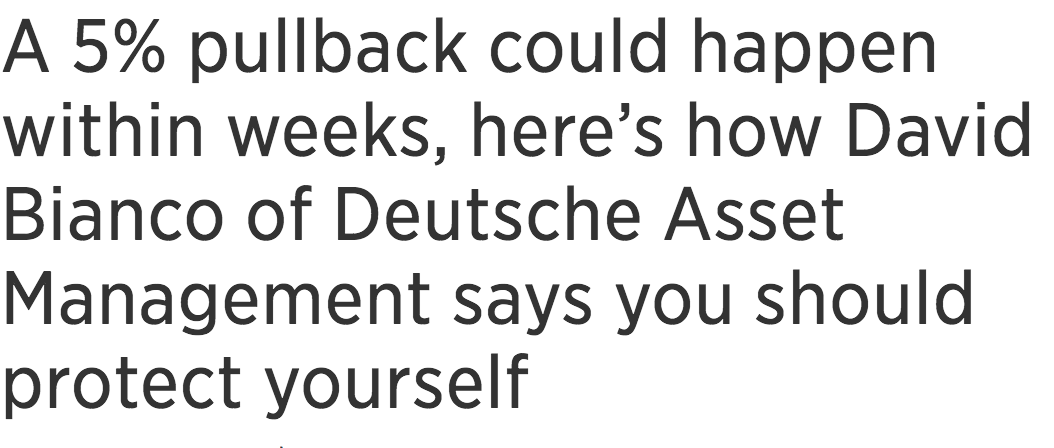I saw the following headline on CNBC last week:

This was the first response that popped into my head, as shared on Twitter:
If you're worried about protecting against 5% corrections you shouldn't be invested in stocks in the first place https://t.co/jDmpLHfxSS
— Ben Carlson (@awealthofcs) August 31, 2017
This is fairly simple, and some would say obvious, advice on the markets but sometimes investors need to be reminded of the simple and obvious The obvious stuff is often the first casualty of the firehose of information, noise, opinions, predictions, and analysis out there these days.
I’m no different in all of this so I like to remind myself of the following obvious investment truths on a regular basis:
1. If you need to spend your money in a relatively short period of time it doesn’t belong in the stock market.
2. If you want to earn higher returns you’re going to have to take more risk.
3. If you want more stability you’re going to have to accept lower returns.
4. Any investment strategy with high expected returns should come with the expectation of losses.
5. The stock market goes up and down.
6. If you want to hedge against stock market risk the easiest thing to do is hold more cash.
7. Risk can change shape or form but it never really goes away.
8. There’s no such thing as a perfect portfolio, asset allocation or investment strategy.
9. No investor is right all the time.
10. No investment strategy can outperform at all times.
11. Almost any investor can outperform for a short period of time.
12. Size is the enemy of outperformance.
13. Brilliance doesn’t always translate into better investment results.
14. “I don’t know” is almost always the correct answer when someone asks you what’s going to happen in the markets.
15. Watching your friends get rich makes it difficult to stick with a sound investment plan.
16. If you invest in index funds you cannot outperform the market.
17. If you invest in active funds there’s a high probability you will underperform index funds.
18. If you are a buy and hold investor you will take part in all of the gains but you also take part in all of the losses.
19. For buy and hold to truly work you have to do both when markets are falling.
20. Proper diversification means always having to say you’re sorry about part of your portfolio.
21. Day trading is hard.
22. Outperforming the market is hard (but that doesn’t mean it’s impossible).
23. There is no signal known to man that can consistently get you out right before the market falls and get you back in right before it rises again.
24. Most backtests work better on a spreadsheet than in the real world because of competition, taxes, transaction costs and the fact that you can’t backtest your emotions.
25. Compound interest is amazing but it takes a really long time to work.
26. Investing based on what every billionaire hedge fund manager says is a great way to drive yourself insane.
27. It’s almost impossible to tell if you’re being disciplined or irrational by holding on when your investment strategy is underperforming.
28. Reasonable investment advice doesn’t really change all that much but most of the time people don’t want to hear reasonable investment advice.
29. The best investment process is the one that fits your personality enough to allow you to see it through any market environment.
30. Successful investing is more about behavior and temperament than IQ or education.
31. Stock-picking is more fun but asset allocation will have more to do with your overall performance.
32. Don’t be surprised when we have bear markets or recessions. Everything is cyclical.
33. You are not Warren Buffett.
34. The market doesn’t care how you feel about a stock or what price you paid for it.
35. The market doesn’t owe you high returns just because you need them.
36. Predicting the future is hard.
Further Reading:
Yeah But…
*******
